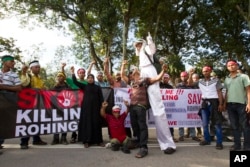Myanmar will provide regular updates on an ongoing crisis in Rakhine state to fellow ASEAN members and possibly work with them to coordinate aid efforts, officials said following a meeting of the group’s foreign ministers in Yangon Monday.
The meeting is the first high-level regional briefing on what’s been happening in western Myanmar, where the military has been carrying out a bloody manhunt in a predominantly Muslim area of Rakhine after nine police officers were killed there in early October.
“I believe that in the spirit of maintaining ASEAN centrality and cohesiveness, we have to address this issue collectively,” Malaysia’s Foreign Minister Anifah Aman said at the meeting, according to a statement.
Myanmar “must do more,” he said, singling out the importance of unimpeded humanitarian access with coordination from ASEAN.
Aman, who warned that groups like the Islamic State could take advantage of the crisis, also proposed establishment of an “independent group of experts" to investigate allegations of abuses in Rakhine.
Both the Rakhine state government and the national government have established investigative committees, though their independence has been questioned.
Dozens of Muslims from the mainly Buddhist country’s Rohingya minority died in the initial attacks, which the government blamed on a new militant insurgency funded from abroad.
Since the surprise October assault on the police posts, Myanmar has sealed off the area near the violence, allowing in only limited aid and official delegations on guided tours. A group of journalists is expected to visit the area soon, though it’s not clear how much access they will be given.
The military crackdown has led to accusations of rape and arson that Amnesty International Monday called a “scorched-earth campaign” that could amount to crimes against humanity.
Despite satellite imagery and countless testimonials of abuse that have filtered out through rare interviews by phone or in Bangladesh, where more than 20,000 Rohingya have fled, Myanmar’s government has generally said the accusations are part of a propaganda effort led my militants.
Kyaw Zeya, permanent secretary at Myanmar’s Foreign Ministry repeated the government position that genocide and ethnic cleansing were not taking place, saying that description was “from the reality on the ground.”
“We have already inspected with the concerned security authorities to act in accordance with the rule of law and also the regulation in accordance with the international norms,” he said.
“On the other hand we also give regards to ASEAN solidarity,” he added. “So everything we consider is from the perspective of maintaining ASEAN solidarity within the Association. This is our perception. So we explain this to our other member countries if they want some information they can contact and they can also consult with us we are very eager to share information with them."
The developments in Yangon Monday are a small coup for the Malaysian government, which reportedly proposed the meeting after its prime minister, Najib Razak, referred to the crackdown as “genocide.” Others have called it "ethnic cleansing."
In his statement, Aman backed recommending that Myanmar could “dispel these allegations” by providing timely and accurate information and provide access to areas impacted.
Tens of thousands of Rohingya Muslims have migrated to Malaysia, though many lack citizenship. In Rakhine, more than 120,000 live in camps in the central part of the state after inter-communal violence killed hundreds in 2012.
The foreign ministers who attended the event in Yangon said the meeting had been productive.
"We had a very transparent and honest exchange of views during the meeting,” Indonesian Foreign Minister Retno Marsudi told reporters on the sidelines of the retreat, which was attended by Aung San Suu Kyi in her role as Myanmar’s foreign minister.
Myanmar will update ASEAN member countries regularly, Marsudi added.
“So we sit as one family to listen to what is actually going on and to say that we are waiting to help Myanmar in again restoring the peace and stability in Rakhine state.”







